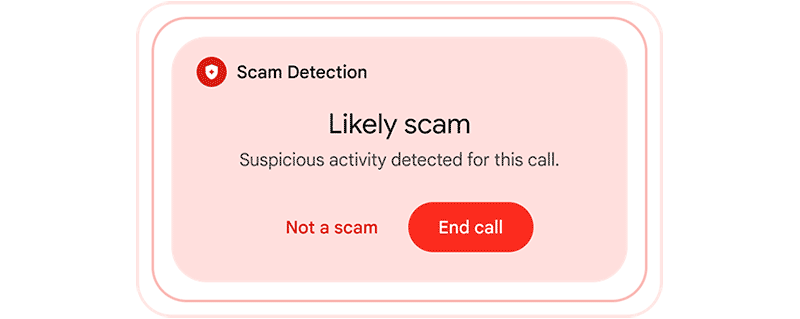Google: Real-time detection and protection against phone scams
Introduction
Scammers steal over a billion dollars annually from individuals, with phone calls being their preferred method. Even more alarming, phone scams are evolving, becoming increasingly sophisticated, harmful, and difficult to detect.
For this reason, many operators and tech giants are seeking solutions powered by Artificial Intelligence (AI) to improve defense on two fronts: identifying fraudulent calls in real-time and creating innovative strategies to divert attackers' attention and protect their customers.
In this article, we’ll review the basics of phone scams, how the industry is leveraging AI to develop detection and user protection tools, and the impact of these advancements on user privacy, concluding with insights and basic tips to defend against these attacks.
AI is becoming the first line of defense against phone scams.
Let’s break it down: What is a phone scam?
A phone scam occurs when someone attempts to deceive you into revealing personal information, money, or access to your devices through a call, text message, WhatsApp, or voicemail.
Scammers may impersonate a legitimate company, a government agency, or even someone you know, such as a friend, family member, or colleague, in an attempt to gain your trust.
Once they succeed, they typically request your financial data, passwords, or personal information, which they can use to steal your money or identity.
Most common phone scam types
- Phishing: You may receive a call or text message claiming to be from your bank, a delivery company, the government, or a service provider, asking you to confirm personal details. These messages often convey urgency and might sound serious or too compelling to pass up, such as a special offer or a warning about losing access to a service.
- Tech support: Someone pretends to be from a tech company, warning you about an issue with your device. They’ll request remote access or payment to fix the problem, but in reality, they’re accessing your personal data.
- Missed calls: You receive a missed call from an unrecognized number, often from abroad. When you return the call, you’re unknowingly charged a premium rate.
- Prizes and lotteries: You’re told you’ve won a prize, but to claim it, you must pay a fee or provide personal details. If it sounds too good to be true, it probably is.
Google: Smarter AI-powered protection against scams
Google recently announced the integration of real-time scam detection into the Google Phone app, available on many Android phones. This feature, currently in beta, will continue evolving based on feedback from users who opt to test it.
The rollout will start with Google’s Pixel devices and is expected to expand to more Android devices soon.
How does Google’s scam detection feature work?
Google’s scam detection functionality employs powerful on-device AI —a critical consideration for privacy, as we’ll discuss later— to notify you in real-time of potential scam calls by detecting conversational patterns commonly associated with scams.
For example, if a caller claims to be from your bank and urgently asks you to transfer funds due to a supposed account breach, the new tool processes the call to determine whether it’s likely fraudulent. If so, it can issue an audio alert, vibration, and visual warning that the call might be a scam.
 Real-time alert generated by Google’s scam detection tool
Real-time alert generated by Google’s scam detection tool
What about privacy?
In this instance, Google, mindful of potential pushback from privacy-conscious users, has followed a privacy by design and by default (PbD) principle to safeguard your privacy and ensure users always maintain control of their data.
- Scam detection is disabled by default, and you can choose whether to enable it for future calls.
- The AI detection model and processing are entirely on-device, meaning no audio or transcription of the conversation is stored on the device, sent to Google’s servers, or retrievable after the call.
- At any time, users can disable this feature for all calls via the Google Phone app settings or for a specific call.
O2: AI simulates an elderly persona to distract scammers
Meanwhile, British telecom operator O2, part of the Telefónica group, continues investing in fraud prevention through AI-powered tools to combat spam and new call identification services at no additional cost to users.
O2 has developed dAIsy, a cutting-edge AI bot designed to engage scammers over the phone for as long as possible. While they’re busy talking to dAIsy, they’re not bothering you. More information about dAIsy is available in the following video.
The inspiration for this AI bot stems from an earlier tool called Lenny, a voice chatbot that uses sixteen pre-recorded audio clips to mimic a slow-speaking, tech-challenged elderly person. Lenny has also been used as a tool to counter unsolicited telemarketing calls.
While it’s too early to evaluate the results of this new tool, if it achieves results similar to its predecessor, Lenny—despite its limited response options—has managed to keep unwanted callers on the line for an hour or more on occasion. This promising outcome inspired the creation of this new “endearing” robot.
Conclusions
Attackers employ previously unseen capabilities enabled by Generative Artificial Intelligence, such as voice cloning and real-time translation, to make identifying scam calls more challenging.
It’s reassuring and logical to see the cybersecurity industry respond accordingly, designing and implementing tools that leverage this disruptive and innovative technology to protect users, as demonstrated in this article with the examples of Google and O2.
These AI-based protection tools will democratize and become an integrated part of our lives in the near future. Until that happens, common sense remains our greatest ally.
Here are some basic tips to protect yourself from scams, which will remain relevant even as AI helps us become more resilient:
- Be cautious about unsolicited calls: If someone calls asking for personal information, hang up and call the company directly using a verified number.
- Don’t share personal details: Banks, government agencies, and service providers will never ask for passwords or PINs over the phone.
- Be wary of urgent requests: Scammers often create a sense of urgency to manipulate victims. Take a moment to think before responding.
- Block suspicious numbers: If you keep receiving calls from a dubious number, block it.
We close with a well-known quote from the late English playwright Noël Coward:
It’s discouraging to think how many people are shocked by honesty and how few by deceit.
 Hybrid Cloud
Hybrid Cloud Cyber Security & NaaS
Cyber Security & NaaS AI & Data
AI & Data IoT & Connectivity
IoT & Connectivity Business Applications
Business Applications Intelligent Workplace
Intelligent Workplace Consulting & Professional Services
Consulting & Professional Services Small Medium Enterprise
Small Medium Enterprise Health and Social Care
Health and Social Care Industry
Industry Retail
Retail Tourism and Leisure
Tourism and Leisure Transport & Logistics
Transport & Logistics Energy & Utilities
Energy & Utilities Banking and Finance
Banking and Finance Smart Cities
Smart Cities Public Sector
Public Sector




